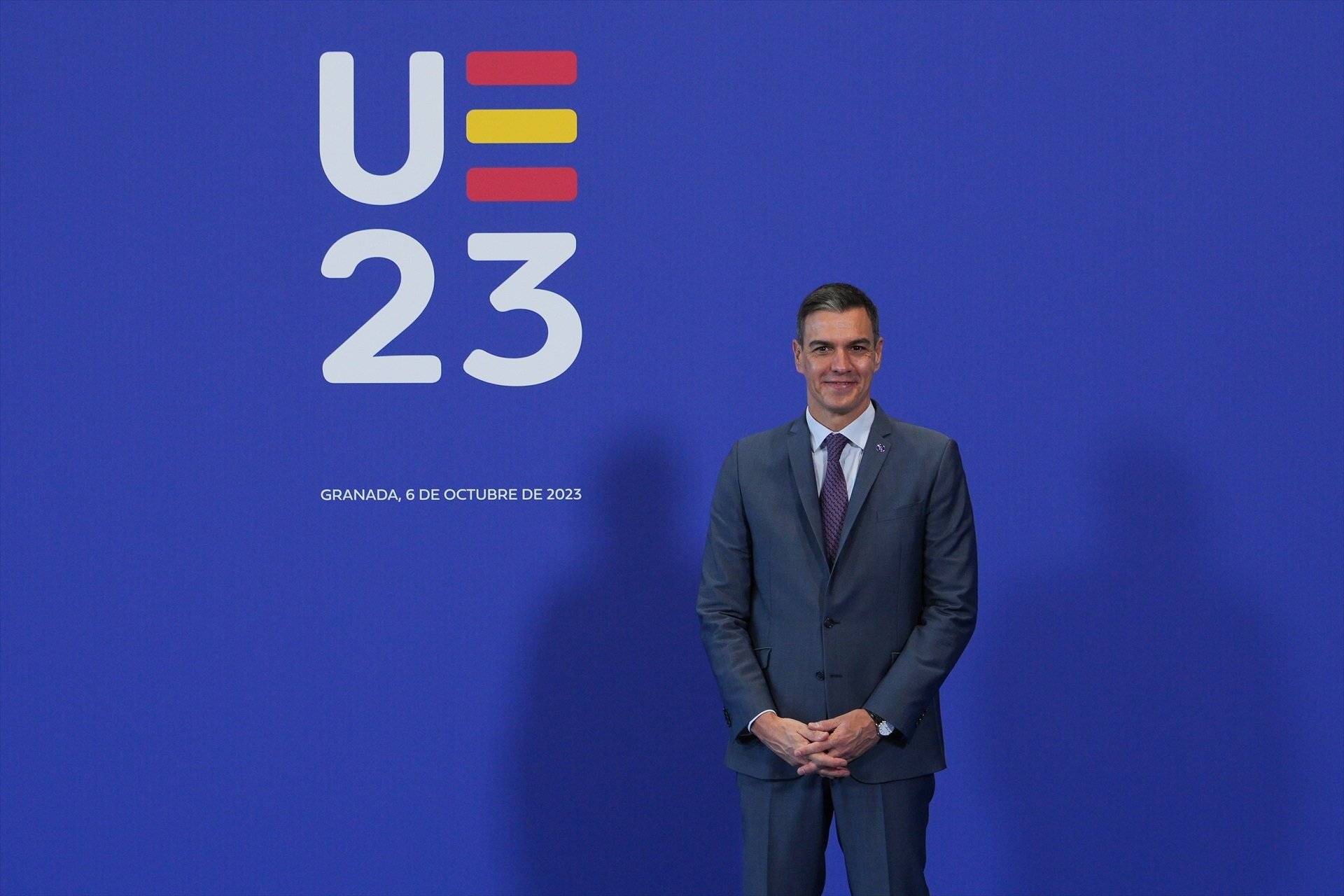The acting Spanish prime minister, Pedro Sánchez, has uttered the word "amnesty" for the first time in the current context, answering questions this Friday from journalists at the press conference that concluded the summit of European leaders in Granada. Asked what his opinion was about the proposal for an amnesty that his prospective left-wing partners Sumar have announced, Sánchez said that "it is not the proposal or the position" of the Socialists (PSOE), although despite this, he admitted that it is one of the formulas proposed that could be used to "try and overcome" the judicial consequences of the 1-O referendum and the Catalan independence process: "We know Sumar's proposal, as we know the proposal of other parties in relation to the amnesty, which is clearly a way of trying to overcome the legal consequences of the situation that Spain experienced in 2017, one of the worst territorial crises under [our] democracy. I also want to say that it is not the proposal of the PSOE, it is not our position."
Sánchez stated that after king Felipe VI tasked him with trying to form a new Spanish government, he will carry out "a real investiture" by talking to the different parliamentary parties, but he did not want to get ahead of future agreements because, he remarked, for now there are none. "I understand that there are news media who are interested, but I can't anticipate an agreement until it happens, we are in the middle of negotiations", he argued.
Sánchez: "There will be no agreement until everything is agreed"
The only certainty that the acting head of the Spanish executive is able to convey for now is that when the agreement takes place it will be "absolutely transparent and public: the objective is very simple, what we have done for these last five years in terms of policies for progress and social coexistence within the framework of the Spanish Constitution". In this regard, he reiterated that "there will be no agreement until everything is agreed and nothing will be agreed until everything is agreed".
Pedro Sánchez showed himself sympathetic to the desire of the media to know more details on the negotiations that may take place in relation to the amnesty for Catalans prosecuted for independence process actions and he wanted to make it clear that any step forward that is taken in this area will be executed with full "democratic normality". For now, he said, his goal is to form a government to allow the election mandate from July 23rd to take shape.
What is Sumar's proposal?
From January 1st, 2013 until now. That is the perimeter proposed by the left-wing Sumar platform for an amnesty law that exonerates the "actions" carried out in connection with the Catalan independence process. Therefore, it would not only include the configuration and holding of the referendum on October 1st, 2017. Yolanda Díaz's political grouping also proposes to exonerate the consultation of November 9th, 2014. And those who took part would also be exempt from any blame in the battle of Urquinaona, because the text proposes to wipe the slate clean for all those people who protested in decisions taken by the Spanish government or its justice system in relation to the the independence process; that is, in this case, the intense protests in October 2019 held after the announcement of the Supreme Court's sentences for the nine pro-independence leaders.
Sumar proposes, according to the document published exclusively by ElNacional.cat (see below), to exonerate by this measure "all actions or omissions of political intent linked to the objective of achieving the self-determination of Catalonia typified as criminal or administrative offences that took place between January 1st, 2013 and the time this law came into force". The text also defends the two-way nature of the law. That is to say, Spanish police officers and Civil Guard members prosecuted for having beaten Catalans during the holding of the 1st October referendum would also be covered by this amnesty. But it adds a nuance, leaving out of the amnesty the actions of police "susceptible to being classified as crimes of torture and other crimes against moral integrity, or the crime of illegal arrests made by an authority or public official".
Meetings with ERC and Junts next week
Sánchez will meet next Wednesday with representatives of the Catalan Republican Left (ERC) and on Friday with members of Together for Catalonia (Junts) as part of the negotiations to obtain support for his investiture. The two meetings are part of the round of contacts that Sánchez is making with the different parliamentary groups after Felipe VI gave him the task of trying to form a government, once the investiture of the leader of the PP, Alberto Núñez Feijóo, had failed.

